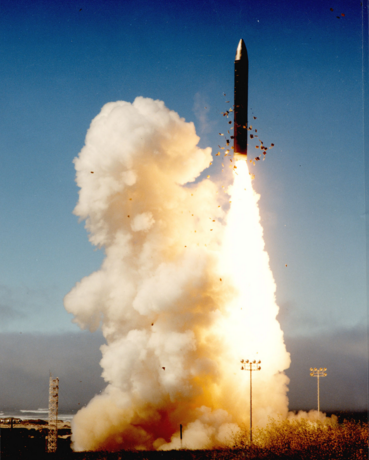North Korea's Nuclear Boasting

The past few weeks have proven very busy on the Korean peninsula as North Korea announced hydrogen bomb tests and fired several ballistic missiles off its coast, including the most recent on April 1st. As The Voice of America summarizes, North Korea has boasted both about supposedly successful hydrogen bomb tests and firing numerous rocket projectiles into the sea.
Although North Korea, as the D.P.R.K Ambassador to the United Kingdom elaborates, views theses various efforts to attain the capacity to strike the United States as purely defensive and reactionary, other world powers seem to disagree. During the nuclear summit recently held in Washington, North Korean nuclear ambitions took center stage Furthermore, International Organizations including the United Nations and European Union have slapped additional sanctions against the D.P.R.K. Even China, often thought as the Kim dynasty’s most reliable ally, has not stopped these measures with its veto power in the Security Council.
Taken collectively, all of this recent action suggests changes for the North Korean issue globally. Although in previous years, one might have rationally concluded that the Kim regime merely sought its own security and domestic power, leveraging nuclear threats mostly as a form of propaganda, the situation appears to in flux under the direction of the still fairly new leader, Kim Jong-Un. Although world leaders dispute the veracity of North Korea’s hydrogen bomb test, as a successful launch would prove a tremendous leap in capabilities in a very short time, the evidence points to North Korea more actively pursuing nuclear arms capable of reaching the United States, which may significantly change the security calculus of American policy makers.
In addition to North Korea’s apparent shift in policy, other states around the world have begun to tweak their diplomatic efforts to respond. For example, the United States has issued joint statements with allied South Korea and Japan, denouncing the D.P.R.K’s actions, in addition to opening discussions for deployment of Terminal High Altitude Area Defense (THAAD) missile defense systems to the Korean peninsula. This shows a clear change in policy for the Americans, as this deployment has already ruffled the feathers of other regional powers such as China and Russia. American and allied security is taking priority over diplomatic considerations. However, despite these disagreements, even China has shown itself more open to countering North Korean attempts to expand its capabilities. As the BBC reports, the Chinese foreign ministry “said it was keen to push for wider talks on North Korea, involving a number of regional powers.” If China follows through, it would signal a previously unlikely alignment with the United States on the issue of North Korea.
Stepping back from the diplomatic dance, regardless of North Korea’s intentions or hopes, the results of its policy appear quite clear. In vying for increased military and political sway, North Korea has pushed its neighbors into common cause where none previously existed. Although China may like North Korea to act as a buffer between its own turf and U.S. garrisoned South Korea, it has no interest in sparking a nuclear conflict with the United States. Likewise, while the U.S. could previously mostly ignore D.P.R.K. threats of nuclear annihilation, as it lacked the ability to acquire or deliver such warheads, now America must consider the possibility of North Korean strikes. Together, a united front of the United States, its allies, and China may sway the Kim regime from its present course. However, as North Korea continues to engage in nuclear tests and ballistic launches, conflict appears more and more likely.
